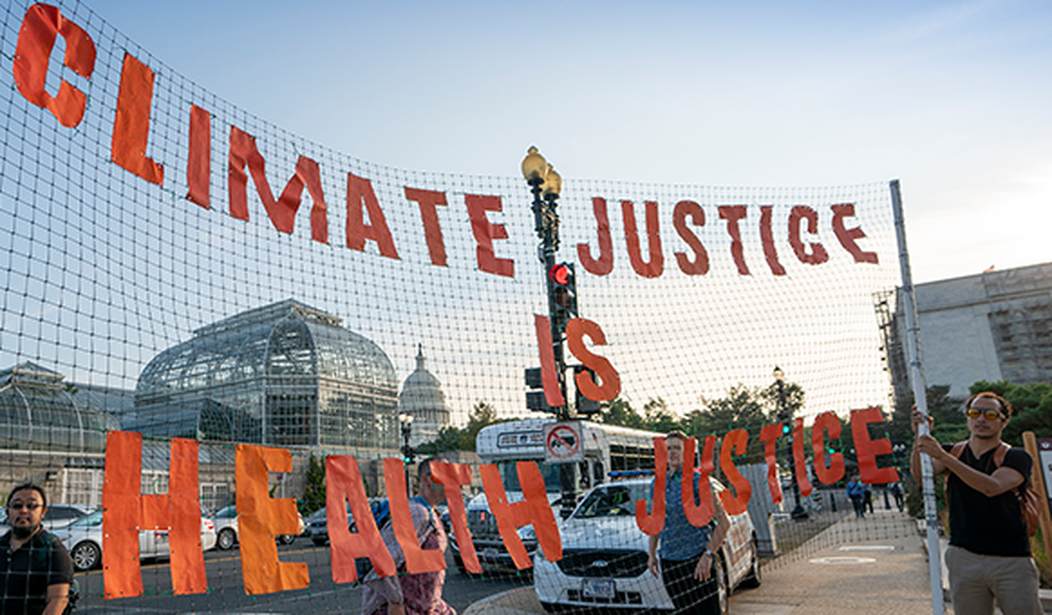This week, Newsmax TV will debut a new documentary, “A Climate Conversation,” which provides an “extensive overview on the various climate challenges and topics that adorn the headlines the world over.” Narrated by Kim Monson, a radio talk show host in Denver, the film seeks to provide viewers with an unbiased, fact-based assessment concerning many aspects of the climate change debate that have largely been ignored, obfuscated, or dishonestly delivered by those who benefit from climate alarmism.
Foremost, “A Climate Conservation” addresses why so many global leaders and powerful institutions are pushing the “climate change is an existential crisis” narrative, despite the fact that the overwhelming evidence proves otherwise. Spoiler alert: It has lots to do with power and money and little to do with “saving the planet” or improving people’s standard of living.
On the topic of the rapid transition to renewable energy, a primary objective of the U.S. government and several other Western nations, the film explains why intermittent power sources such as wind and solar cannot possibly provide enough energy to power our grid as well as detailing the environmental degradation and deplorable labor conditions associated with the so-called green energy industry.
Perhaps most importantly, “A Climate Conversation” dares to defend the use of fossil fuels, which are arguably principally responsible for the rapid increase in people’s standard of living since their advent during the Industrial Revolution.
Unbeknownst to many nowadays, the introduction of fossil fuels (mainly coal) in the late eighteenth century fundamentally changed the human experience for the better. Before humans harnessed fossil fuels for energy production, we were mostly dependent upon the muscle power provided by beasts of burden for large-scale projects and everyday tasks. Long-distance travel was costly, dangerous, and time-consuming, as sailors relied on the wind and land dwellers relied on their feet or a horse, if they were lucky.
Recommended
In the blink of an eye, the arrival of fossil fuels dramatically changed how humans traveled, transported goods, communicated, prepared meals, and went about their everyday lives.
Almost three centuries later, the myriad benefits of fossil fuels remain a central pillar to our increasingly technology-based society. As “A Climate Conversation” deftly points out, our modern world cannot function without derivatives supplied by the production of fossil fuels.
Even the U.S. Department of Energy notes, “petrochemicals derived from oil and natural gas make the manufacturing of over 6,000 everyday products and high-tech devices possible.”
And, guess what? This includes wind turbine blades and solar panels. In other words, were it not for the derivatives supplied by oil and natural gas, wind turbines and solar panels would not exist, along with a whole host of technologies and conveniences that would upend life as we know it.
The film also explains how a world without widespread use of fossil fuels, which is exactly the plan being advocated by the climate alarmists under their misguided Net Zero nonsense, would be catastrophic for humanity itself. Over the past few centuries, the human race has increased from about one billion to eight billion. However, without ample access to fossil fuels and the thousands of commonplace products they’ve spawned, billions of people would die and/or live in abject poverty.
Unlike “An Inconvenient Truth,” Al Gore’s award-winning documentary in 2006 that relied on fearmongering and bombastic prophecies of a rapidly approaching environmental Armageddon (almost all of which have not come to pass), “A Climate Conversation” takes a decidedly different approach by relying on facts, sound science, commonsense, and empirical evidence rather than theories, emotional arguments, and defective modeling.
I highly recommend that anyone who is on-the-fence about the “climate crisis” watch this film.
Moreover, I wish that teachers would give their students both sides of the debate. I was in college when “An Inconvenient Truth” was released, and I remember being forced to watch it in a class that had absolutely nothing to do with the topic of the film. I also remember the vast majority of the students in said class instantly jumping onto the climate change bandwagon.
It has been nearly two decades since “An Inconvenient Truth” was released and became nearly ubiquitous in classrooms across the country. Interestingly, over that same period, the proportion of young Americans who believe climate change is an “existential threat” to humanity and the planet has increased substantially.
For far too long, the climate alarmists have held great sway over the dissemination of information that counters their narrative, including assistance from Big Tech in their quest to suppress any and all counterarguments. For anyone seeking an even-handed, fact-based approach to one of the most significant issues of our time, “A Climate Conversation” is a must-see.
Chris Talgo (ctalgo@heartland.org) is editorial director at The Heartland Institute.

























Join the conversation as a VIP Member